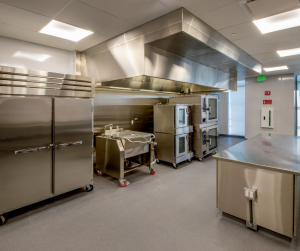 We know that when you think of doing ministry, you’re probably not envisioning inspecting your roof, replacing filters, and making sure gutters are clear.
We know that when you think of doing ministry, you’re probably not envisioning inspecting your roof, replacing filters, and making sure gutters are clear.
But each of these tasks is part of keeping your building and grounds in order. A church that is taken care of can better serve its congregation the community. The last thing anyone should worry about when they come to church is their safety.
Doing routine maintenance needs to be something your church does, like clockwork. If you’re not doing it now, that’s okay. We’re here to walk you through a few basics to get you started.
Keeping Your Kitchen in Order
- Church kitchens are busy places and are key to many church ministries. Vacation Bible schools, youth programs, and a full event calendar typically mean lots of meals. The kitchen can have many hazards, especially for church members who may not use it very often.
- First things first, make sure you have a fire extinguisher on hand. If you do any type of frying, you’ll need a Class K fire extinguisher.
- If your cooking units (stovetop, range, fryers, etc.) units are commercial grade, you’ll need a commercial hood to keep the kitchen adequately ventilated. Check your hood to make sure it covers all of the equipment used during cooking.
- Regularly replace the filter in your hood and, depending on use, clean the hood quarterly or twice per year.
- Keep all equipment in the kitchen clean. Grease and grime can build up, causing parts to malfunction.
- If your kitchen is equipped with an icemaker, check the supply line occasionally. It’s often neglected but typically the source of issues with ice makers.
- In case of leaks, see if you have a floor drain in your kitchen and it’s clear of obstructions.
Originally posted on Southern Mutual Church Insurance Company
This material is for informational purposes only. It is not intended to give specific legal or risk management advice, nor are any suggested checklists or action plans intended to include or address all possible risk management exposures or solutions. You are encouraged to retain your own expert consultants and legal advisors in order to develop a risk management plan specific to your own activities.
ChurchInsure is a division of Anchor Insurance Agencies specializing in the unique insurance and risk management needs of religious institutions. Visit our website to learn how we can serve you at anchor-insurance.com/churchinsure.


